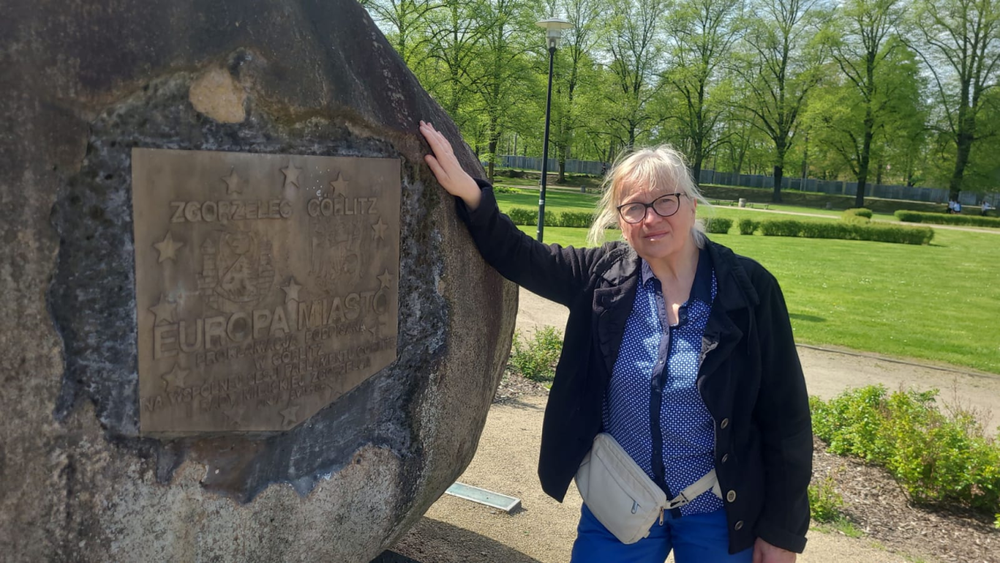Gabriele Schönfelder is the oldest direct student at the HSZG. In this interview, she talks about her reasons for studying later in life and the importance of "lifelong learning".

Gabriele Schönfelder successfully completed her Master's degree in Social Gerontology at the Faculty of Social Sciences at Zittau/Görlitz University of Applied Sciences (HSZG) in 2018 at the age of 67. But that was not enough for her: she began a further Master's degree in Management of Social Change, which she successfully completed in 2023.
A graduate of the Berlin Weißensee School of Art, she initially worked as an interior and product designer. In the 1990s, she was elected to the board of the Association of German Industrial Designers (VDID) as an East German. Her professional life has always been characterized by interdisciplinary work and constant learning.
Schönfelder lived in Bad Muskau from 2003 to 2013 and was heavily involved in cross-border cooperation in the German-Polish region. She initiated numerous projects to tackle demographic change and promote regional development.
The decision to study again was influenced by her involvement in regional development projects and the challenges of structural change. During her studies at the HSCG, she integrated her extensive professional experience and interdisciplinary knowledge into the academic community and actively contributed to discussions and projects.
In her Master's thesis "Resources of Neighbors for the Future", she examined the importance of cooperation in the German-Polish border region of Görlitz/Zgorzelec. Her research emphasized the importance of linguistic and cultural understanding for successful regional cooperation.
Gabriele Schönfelder shows that lifelong learning and active engagement are possible and enriching even in old age. Her time at the Zittau/Görlitz University of Applied Sciences is an inspiring example of the opportunities that curiosity and a thirst for knowledge can open up.
In this interview, Gabriele Schönfelder talks about her reasons and motivations for studying social sciences at an advanced age.
Ms Schönfelder, what motivated you to start studying social gerontology after a successful career?
During my time in Bad Muskau (2003-2013), I developed projects to deal with demographic change. I recognized the opportunities and challenges of structural change and decided to deepen my knowledge. I was familiar with the Zittau/Görlitz University of Applied Sciences through cooperation projects, and I wanted to do academic work myself. Professor Andreas Hoff encouraged me to study Social Gerontology. And that at the age of 67.
What particular challenges did you face during your studies and how did you deal with them?
There were no problems during my first degree course, the part-time Master's in Social Gerontology, as other students were also older. I was the oldest student on the second Master's degree in Management of Social Change, but working with younger fellow students went smoothly. I was good at using digital media thanks to my professional life and didn't feel like I was held back by any means.
How did you work with the younger generation on joint projects?
The collaboration was normal and professional. There were no negative comments and my average grade was good. The students appreciated my contribution and there was some surprise as to whether a degree made sense at an older age, which I answered in the affirmative.
How have your professional experiences affected your studies and your view of the social sciences?
My work as an interior architect and product designer required interdisciplinary collaboration, which proved helpful in my studies. I focused more on the resources of people of different ages and genders.
How have your experiences on the student and faculty council influenced your view of education and social change?
The university should focus on research and teaching and work with students on an equal footing. Working in the councils showed me the importance of good preparation and respectful interaction.
Can you tell us more about your Master's thesis "Neighbors' resources for the future"?
I investigated cooperation in the German-Polish border region of Görlitz/Zgorzelec and the importance of shared resources. The results showed a high level of identification of the residents with the region and the need for multilingual dialog.
How did your Erasmus semester abroad at the University of Wroclaw broaden your perspective?
The semester abroad broadened my horizons, especially through the international nature of the university and the Willy Brandt Center. I dealt more intensively with the history and development of the EU border regions.
What advice would you give to people who want to study in middle or old age?
Learning requires curiosity and a willingness to make an effort. There are many ways to actively age and continue your education. It is important to set priorities and take care of your health.
What does "lifelong learning" mean to you?
Lifelong learning means constantly learning new things, whether informally or through courses. I overcame health challenges during my studies by taking breaks and engaging in physical activities.
What goals do you have for the future?
Professionally, it is difficult to be involved as an older scientist, but I continue to work on projects on resources in old age and the development of the European City of Görlitz/Zgorzelec.
Finally, what would you like to tell other people about your educational path?
Stay authentic and think about self-efficacy. Learning is a way to stay active and enjoy life. Use your individual resources and spread a positive vibe. Be calm and mindful. One of my favorite quotes from Marcus Aurelius is: "Over time, the soul takes on the color of thoughts".
The interview was conducted by Cornelia Rothe, University Development and Communication Office.